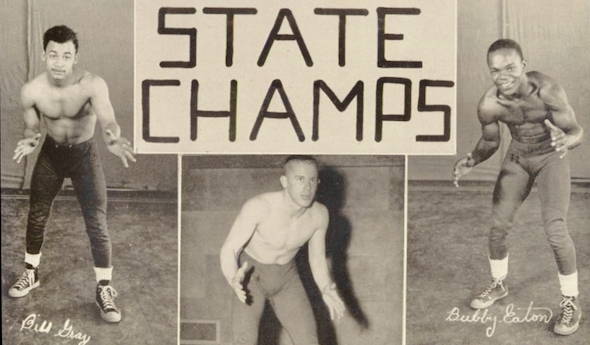
Old 5-A League Fueled Wrestling's Rise
June 29, 2020
By Ron Pesch
Special for Second Half
This latest quest into wrestling began with an inquiry, as these projects often do.
My work with the MHSAA – which includes the title ‘historian’ – is mostly a hobby that began many years ago. The diversion often gets me into press boxes and places the average sports fan doesn’t usually get to venture. Now and then, I get to talk into a microphone. But mostly, it is hours of digging; pouring through scrapbooks, yearbooks and newspapers, old and new, as I search for names, details and stories lost in time. The pursuit sometimes leads to awkward phone calls, e-mails and messages where I try to describe who I am and why I’m chasing a phone number for someone, a person’s mother or father, grandmother or grandfather.
I adore the chase and resolving mysteries. I love visiting libraries and schools and delight in connecting with people. I love filling in holes and connecting dots. I’m a computer guy by trade, focused on analyzing and aligning data. I equate sports searches to detective work, and for fans of old television, I’m like Columbo without the trench coat or cigar, always asking, “Just one more thing …”
Wrestling
My first visit to the sport was in junior high gym class. That’s when Coach Murphy paired me up against another undersized classmate. With the shrill of a whistle, we battled it out on a deep red colored mat – representative of one half of the red and grey school colors of Nelson Junior High. The struggle lasted for no more than a matter of seconds. With a slap of a mat, or perhaps another whistle, it was over. I lost by ‘fall’ – the gentler way of saying I was pinned.
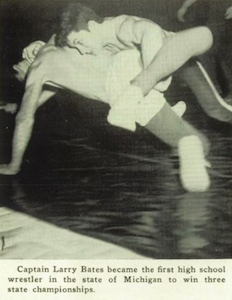 My second visit to the sport came in high school. That’s when the wrestling coach stopped me in the hall one day to suggest I join the wrestling team. Apparently, word of the skills I demonstrated at Nelson hadn’t travelled the half mile east from the junior high to the high school. Quickly recognizing this fact, I told him it might be counter-productive, as I wasn’t much of a wrestler. He was undeterred. Because I was still undersized, he said, I would likely win a fair number of matches. Many schools, it seemed, struggled to find someone to wrestle in the lower classes, and hence, would have to forfeit. I still turned him down.
My second visit to the sport came in high school. That’s when the wrestling coach stopped me in the hall one day to suggest I join the wrestling team. Apparently, word of the skills I demonstrated at Nelson hadn’t travelled the half mile east from the junior high to the high school. Quickly recognizing this fact, I told him it might be counter-productive, as I wasn’t much of a wrestler. He was undeterred. Because I was still undersized, he said, I would likely win a fair number of matches. Many schools, it seemed, struggled to find someone to wrestle in the lower classes, and hence, would have to forfeit. I still turned him down.
I give credit to the Coach Erickson. He was trying to involve a kid in athletics that wasn’t going to make the football, basketball or track team. But that bit of wisdom didn’t hit me until long after high school.
As the above may demonstrate, an extensive understanding of the intricate particulars of wrestling isn’t my strong suit. I’ve attended only one MHSAA Wrestling Final. That visit still remains among my favorite sports sights. The pageantry of the Grand March staged before the orchestrated pandemonium of the MHSAA wrestling championship combined with huge crowds and inspiring athleticism creates a spectacular event.
The Latest Project
Recently, a question, relating to past individual champions from the earliest days of the championships, arrived at the MHSAA office. The Association has awarded wrestling titles since 1948, and a list of team champions and runners-up from the beginning to the present appear on the MHSAA Website. Missing, however, are the names of the individuals who won championships between 1948 and 1960.
To find an answer, that meant a deep dive into newspapers, yearbooks and old wrestling guides to exhume the particulars from articles and agate, cross-referencing results, matching last names to first names, correcting spellings and occasionally schools when obvious errors have been made.
Technology has helped carve away some time and travel when embarking on such a project. Once, the only way to dig out such information was to travel to microfilm, and then spend hours scrolling past print. Today, thanks to some online archives, even during a global pandemic, we can visit a handful of Michigan newspapers via the internet. Tack on the ability to search the online cloud of information, intriguing elements intermittently bubble to the surface, transforming a standing list of names and schools to an account that brings at least some names to life.
The Beginnings
An initial look at the existing team championship listings revealed the first fact. For all intents and purposes, the earliest days of the MHSAA wrestling state championships served as a glorified meet for the members of the 5-A Conference. The league, comprised of Ann Arbor, Battle Creek Central, Jackson, Lansing Eastern and Lansing Sexton high schools, was where wrestling as a prep sport first gained traction in Michigan. Almost immediately, Greater Lansing established a stronghold on the sport that would last those first 13 years.
From 1948 to 1960, there was only one classification in which all schools, regardless of size, competed. In 10 of those 13 years, one of two Lansing high schools – Eastern or Sexton – won the state’s mat championship. In the three years when a Lansing team didn’t win, they finished as runner-up. Those three were part seven total of that baker’s dozen when either Eastern or Sexton finished second.
Growth in Michigan
The first championship tournament in 1948 involved around a dozen schools. While expansion into other schools commenced slowly, by 1957, wrestling had progressed into the fastest growing sport in Michigan.
“The sport blossoms into many new schools every year,” stated George Maskin in a January issue of the Detroit Times in 1957. “Best estimates are that at least 60 varsity prep teams now are in competition. The figure should come close to the 100 mark within a year or two. Prep wrestling has grown with such swiftness it now is necessary to hold regionals to determine qualifiers for the state meet.
“It is not the kind of wrestling one has watched on television or in some of the professional arenas around the state,” he added, trying to educate the public about the difference between the prep sport and the form of broadcast entertainment then popular. “Groans and grunts have no part in high school wrestling … nor does hair pulling or stamping the feet … or pointing a finger into the referee’s eye.”
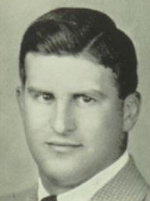 Coaches of wrestling noted that it was one of the few sports offered that gave equal opportunity to students regardless of their physical build. Separated into 12 weight classifications, running from 95 pounds and under up to the unlimited, or heavyweight division, there was a place for all.
Coaches of wrestling noted that it was one of the few sports offered that gave equal opportunity to students regardless of their physical build. Separated into 12 weight classifications, running from 95 pounds and under up to the unlimited, or heavyweight division, there was a place for all.
“Take the kid who weighs 95 pounds,” Ignatius ‘Iggy’ Konrad, a former wrestler at Michigan State and the coach at Lansing Sexton, told Maskin. “He’ll participate against a boy of similar weight. Thus a kid whose athletic possibilities might appear hopeless (in other sports) finds a place for himself in wrestling.”
As the sport continued to expand, coaches were still trying to explain the worth.
“Parents should try to understand the difference between television wrestling and high school and college wrestling,” Grandville coach Kay Hutsell told a Grand Rapids Press reporter in December 1960. “There is no comparison. TV is 100 percent acting.”
A state champion wrestler as a high school student in Illinois, where spectator interest and participation was far greater than in those early days of wrestling in Michigan, Hutsell twice lettered in the sport at Indiana University.
“Wrestling is a conditioner and perhaps develops the body better than any other sport. About the only way wrestling can educate the adults (in the western Michigan area about the sport) is through newspapers.” He felt people should come to “see for themselves.”
The Tournament
Lansing Sexton won the state’s inaugural team wrestling title, 54-43 over the Ann Arbor Pioneers, with the event run off on the mats of the University of Michigan in 1948. Both Floyd Eaton at 127 pounds and Carl Covert at 133 ended the year undefeated for the Big Reds. Five wrestlers from each school earned individual titles that first year. Jackson’s heavyweight, Norm Blank, scored a pin over Sexton’s Dick Buckmaster. The pair had split their two previous matches during league competition.
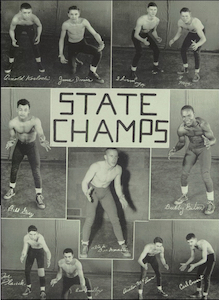 Ann Arbor grabbed the next two MHSAA team titles, both by a mere four points, first 60-56 over Sexton, then topping the Quakers of Lansing Eastern, 56-52, in 1950.
Ann Arbor grabbed the next two MHSAA team titles, both by a mere four points, first 60-56 over Sexton, then topping the Quakers of Lansing Eastern, 56-52, in 1950.
Eight wrestlers qualified for the final round for both Ann Arbor and Sexton in 1949, with five each earning championships. Both schools had three wrestlers finish in third and fourth place; hence the team title was awarded based on Ann Arbor tallying more pins. A total of 96 wrestlers from 11 schools participated in the tournament. Ted Lennox, wrestling at 95 pounds, became the first athlete from the Michigan School for the Blind to compete for an individual title but was defeated by Sexton’s Leo Kosloski. Lennox would later wrestle for Michigan State.
In 1950, nine Ann Arbor wrestlers advanced to the final round with six seizing championship medals, but only Sam Holloway repeated as champion from the previous year. Teammate Jack Townsley, who had won in 1949 at 112 pounds, finished second at 120.
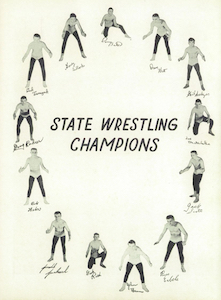 Eastern and coach Don Johnson grabbed the first of two consecutive titles in 1951, topping Ann Arbor, 56-52, with East Lansing finishing a distant third with 26 points. Pete Christ of Battle Creek Central became the first Bearcat (and only the second athlete from a school other than Eastern, Sexton or Ann Arbor) to bring home an individual wrestling title, with a decision over Lansing Eastern’s Vince Malcongi in the 140 classification. “The Bearcat matmen took fourth in the State,” according to the Battle Creek yearbook. “Mr. Donald Cooper took over the coaching duties when Mr. Allen Bush was called to the Marines.” (Bush would later serve as executive director of the MHSAA).
Eastern and coach Don Johnson grabbed the first of two consecutive titles in 1951, topping Ann Arbor, 56-52, with East Lansing finishing a distant third with 26 points. Pete Christ of Battle Creek Central became the first Bearcat (and only the second athlete from a school other than Eastern, Sexton or Ann Arbor) to bring home an individual wrestling title, with a decision over Lansing Eastern’s Vince Malcongi in the 140 classification. “The Bearcat matmen took fourth in the State,” according to the Battle Creek yearbook. “Mr. Donald Cooper took over the coaching duties when Mr. Allen Bush was called to the Marines.” (Bush would later serve as executive director of the MHSAA).
Johnson’s squad absolutely dominated the field in 1952, topping Sexton the next year, 68-43. Ann Arbor followed with 39 points. Seven Quakers – George Smith (95), Herb Austin (103), Jim Sinadinos (127) Bob Ovenhouse (133), Bob Ballard (138), Ed Cary (145) and Norm Thomas (175) – all won their final matches. Both Austin and Sinadinos were repeat champions.
Sexton flipped the table in 1953 with a 67-46 win over Eastern. Ten Big Reds competed for individual state championships among the 12 classifications, with five taking home titles. The Big Reds’ Ken Maidlow, jumping from 165 pounds to 175, and Eastern’s Ed Cary, who moved up to 154, both repeated as medal winners. In the heavyweight class, Sexton’s Ray Reglin downed Steve Zervas from Hazel Park. (Zervas, a two-time runner-up, later wrestled at the University of Michigan, then coached wrestling at Warren Fitzgerald for 34 seasons and served as mayor of Hazel Park from 1974 to 1986).
In 1954, Ossie Elliott of Ypsilanti and Henry Henson of Berkley became the first wrestlers from non 5-A schools to win individual state wrestling titles. Elliott, who had finished as state runner-up in 1953 at 133 pounds, downed Lansing Sexton’s Tom Holden in the same classification. Henson earned a decision over Lansing Eastern’s Ken Bliesener at 154 pounds. Eastern again returned to the winner’s circle, outdistancing Sexton, 60-44. Ypsilanti finished third with 34 points.
By 1955, athletes from 28 high school teams were battling for state team and individual honors on the mats at MSC’s Jenison Field House. As a senior captain, Lansing Eastern’s Larry Bates pinned four out of five opponents in the 112-pound class to become Michigan’s first wrestler to earn three state crowns. Bates grabbed his first title in 1953, competing at 95 pounds, followed by his second in 1954 at 103. Eastern picked up its second-straight team trophy, racking up 102 points on the way to a fourth crown in the eighth year of championships. For the first time, a non-5-A school finished second, as the Ypsilanti Braves grabbed runner-up honors with 84 points.
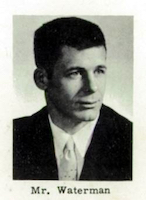 Coach Bert Waterman led Ypsilanti to the first of four championships during a 10-year span in 1956. Two Braves, Ambi Wilbanks and Walt Pipps, earned titles while three others finished second in their classifications. Ypsi had lost one dual meet during the regular season, to Lansing Eastern, by a slim three-point margin. With the 1967-68 school year, Waterman would embark on a 24-year career as coach at Yale University after posting a 192-35-4 mark in 16 seasons at Ypsilanti. A 1950 graduate of Michigan State, the former Spartans wrestler would join Eastern’s Don Johnson, Sexton’s Iggy Konrad, Fran Hetherington from the School for the Blind and two other high school coaches as a charter member of the Michigan Wrestling Hall of Fame in November 1978.
Coach Bert Waterman led Ypsilanti to the first of four championships during a 10-year span in 1956. Two Braves, Ambi Wilbanks and Walt Pipps, earned titles while three others finished second in their classifications. Ypsi had lost one dual meet during the regular season, to Lansing Eastern, by a slim three-point margin. With the 1967-68 school year, Waterman would embark on a 24-year career as coach at Yale University after posting a 192-35-4 mark in 16 seasons at Ypsilanti. A 1950 graduate of Michigan State, the former Spartans wrestler would join Eastern’s Don Johnson, Sexton’s Iggy Konrad, Fran Hetherington from the School for the Blind and two other high school coaches as a charter member of the Michigan Wrestling Hall of Fame in November 1978.
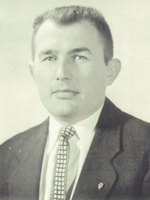 Runner-up in 1956, Eastern grabbed another title in 1957 topping Battle Creek Central, 93-89, in the tournament standings. It was a surprise “going away present” for Coach Don Johnson, who was stepping away after 10 seasons of coaching the Quakers to accept the assistant principal position at Eastern. Battle Creek had five wrestlers advance, and held a 56-48 lead over Eastern as the teams entered the final round. The Quakers’ Ted Hartman opened the day with a victory in the 98-pound weight class, helping Eastern post a 3-1 record in championship round matches. Sexton assisted with the Eastern victory when Norm Young defeated Battle Creek’s Bob McClenney in the 120 weight class. The Bearcats, who had five wrestlers in the finals, ended with two individual champs on the day and their highest finish in their 10 seasons of wrestling.
Runner-up in 1956, Eastern grabbed another title in 1957 topping Battle Creek Central, 93-89, in the tournament standings. It was a surprise “going away present” for Coach Don Johnson, who was stepping away after 10 seasons of coaching the Quakers to accept the assistant principal position at Eastern. Battle Creek had five wrestlers advance, and held a 56-48 lead over Eastern as the teams entered the final round. The Quakers’ Ted Hartman opened the day with a victory in the 98-pound weight class, helping Eastern post a 3-1 record in championship round matches. Sexton assisted with the Eastern victory when Norm Young defeated Battle Creek’s Bob McClenney in the 120 weight class. The Bearcats, who had five wrestlers in the finals, ended with two individual champs on the day and their highest finish in their 10 seasons of wrestling.
An All-American wrestler at Michigan State, Johnson would remain at Eastern throughout his education career, retiring as principal in 1983. The fieldhouse at Eastern was named after him in December 1984, fittingly just prior to the championship round of the annual Eastern High Wrestling Invitational.
Eastern again went back-to-back, topping Sexton, 88-57, with Ypsilanti third in the 1958 championship standings. The meet, culminating with 16 boys competing in each weight division – four each from regionals hosted at Battle Creek, Lansing, Ypsilanti and Berkley – was held at the Intramural Building at the University of Michigan. Both Eastern and Sexton advanced four wrestlers to the final round, with Eastern’s Gary Gogarn (95), Ron Parkinson (145) and Alex Valcanoff (154) earning titles. For Sexton, Fritz Kellerman (133) and Wilkie Hopkins (138) finished on top.
The 1959 championships, hosted at the new intramural building at MSU, found boys from 47 schools chasing medal honors.
“Points toward the team title are awarded one for each bout won, with an extra point for a fall,” noted the Lansing State Journal, explaining the mechanics of the tournament. “The big scoring chance comes (in the final round) with a first place netting 10 points, second 7, third 4 and fourth 2.”
Jackson and Sexton had tied for the 6-A Conference crown (the league renamed with the addition of Kalamazoo Central to the mix) and the race to the MHSAA title was expected to be a tight one. Jackson qualified seven for the semifinal round, with four advancing to the championships. The Big Reds sent five wrestlers to the last round. Vikings Ron Shavers (95), Nate Haehnle (145) and Don Mains (165) had each won matches, while Sexton’s qualifiers Tom Mulder (127) and Emerson Boles (175) had earned titles.
With one match remaining, Jackson trailed Iggy Konrad’s Big Reds by four, 67-63, as the Vikings’ Ed Youngs – the state’s reigning heavyweight champion – squared off with Sexton’s Mickey Devoe. Youngs grabbed a 3-1 decision to repeat, but the Vikings needed a fall in the match for a tie. Hence, the Big Reds eked out a single-point victory, 74-73, to escape with their third state mat title.
The results of the title round of the 1960 tournament, also won by Sexton, telegraphed how far the sport had come. Wrestlers from a dozen high schools squared off for honors in the title matches, with winners representing 10 cities. The Big Reds topped Ypsilanti 70-64, followed by Kalamazoo Central with 56 points. Eight other schools had scored at least 20 points in the tournament; 31 teams had scored at least a point. Tom Mulder of Sexton was the lone repeat champion.
With 112 schools now offering wrestling on their sports menu, the MHSAA split the event into two parts for the 1959-60 school year, with Class A set for the University of Michigan and Class B hosted by Michigan State University. The sport was now in full bloom.
 Ron Pesch has taken an active role in researching the history of MHSAA events since 1985 and began writing for MHSAA Finals programs in 1986, adding additional features and "flashbacks" in 1992. He inherited the title of MHSAA historian from the late Dick Kishpaugh following the 1993-94 school year, and resides in Muskegon. Contact him at [email protected] with ideas for historical articles.
Ron Pesch has taken an active role in researching the history of MHSAA events since 1985 and began writing for MHSAA Finals programs in 1986, adding additional features and "flashbacks" in 1992. He inherited the title of MHSAA historian from the late Dick Kishpaugh following the 1993-94 school year, and resides in Muskegon. Contact him at [email protected] with ideas for historical articles.
PHOTOS: (Top and 4) Lansing Sexton won the first MHSAA Finals in wrestling in 1948. (2) Eastern’s Larry Bates became the first three-time individual champion in MHSAA history in 1955. (3) The Big Reds were led by coach Ignatius Konrad. (5) Lansing Eastern kept the championship in the capital city in 1949. (6) Bert Waterman built one of the state’s top programs at Ypsilanti. (7) Don Johnson was the architect of Eastern’s program.(Photos gathered by Ron Pesch.)
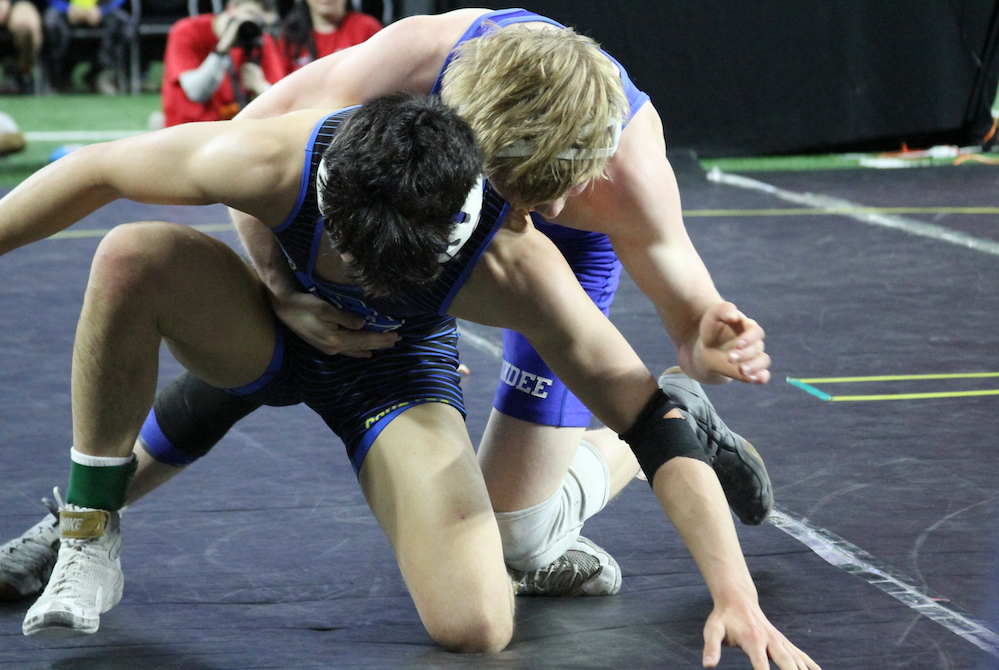
Davis Becomes Dundee's Latest Member of 4-4 Club with Individual Sweep
By
Drew Ellis
Special for MHSAA.com
March 4, 2023
DETROIT – Winning four MHSAA Individual Finals wrestling titles is quite an accomplishment.
Winning eight total wrestling championships is even more impressive.
But, that’s becoming somewhat commonplace for the Dundee wrestling program.
On Saturday, Dundee senior Braeden Davis (41-0) became the fifth wrestler in MHSAA history to win a fourth individual wrestling state championship to go with four team state championships as he defeated Grand Rapids Catholic Central’s Michael Wilson (32-4), 3-1, in the 132-pound Division 3 final.
Three of the five four-four winners have come from the Dundee program, as Davis joined Stoney Buell (2018-21) and Casey Swiderski (2019-22).
“It means a lot. I am glad and proud for myself. It’s a great privilege and great accomplishment,” Davis said of joining the four-time winner club. “It means a lot to (join the other two with eight titles). We trained a lot together. We all managed to succeed and get things done.”
Davis hadn’t seen a third round in his previous three Individual Finals weekends and still hadn’t until Saturday. The first two rounds of the championship match were scoreless before Davis got an escape to start the third and then finally scored a takedown later in the round to go up 3-0.
“I try not to think about (winning quickly) because that is something that can make me nervous. I just try to drown it out and not think about that,” Davis said. “I just had to wrestle smart and keep my hands down. I managed to hit a nice little go-behind.”
Davis was one of seven Dundee wrestlers to capture an individual championship Saturday.
106
Champion: Haydn Nutt, Dundee, Fr. (38-6)
Major Decision, 12-2, over Mason Haines, Dundee, Fr. (28-8)
A pair of Dundee freshmen collided in the 106-pound final, with Nutt scoring a decision over teammate Haines.
“It is kind of fun,” Nutt said of wrestling his teammate. “It was pretty exhausting, but it was fun. We’ve been wrestling since we were like 8, so we basically know everything about each other. I was just moving, scoring and shooting. That’s what was working.”
The two have had more competitive battles in the past, but Nutt was bringing an extra level of intensity in the championship bout.
“My blood was pumping the entire time,” Nutt said. “I felt like I had so much energy, and I couldn’t get rid of it.”
113
Champion: Dale Gant, Grand Rapids Catholic Central, Fr. (39-6)
Decision, 2-1, over Talan Parsons, Ovid-Elsie, Jr. (50-1)
Gant knew he needed his best to get past the unbeaten Parsons. After a scoreless first period, Gant managed to secure a takedown in the second and then avoid getting put on his back in the third to hand Parsons his lone blemish of the season.
“I was just trying to stick to my stuff and not let him get comfortable,” Gant said. “I have lost to him in the past, so I knew what to expect from him.”
Following the victory, the GRCC freshman dove into his coaches’ arms, with his coaches perhaps even more excited than the new champion.
“This means a lot. I have been thinking about this day for years,” Gant said. “It’s been playing over and over in my mind. It’s just an amazing feeling.”
120
Champion: Kade Kluce, Dundee, Jr. (42-5)
Major Decision, 14-4, over Noah Harris, Richmond, Sr. (41-6)
Kluce has set himself up to possibly be the next in line for eight wrestling championships.
The Dundee junior claimed his third individual title Saturday to go along with three team titles.
“I feel I could have done better,” Kluce said. “I was hoping for a tech fall and I was close, but didn’t quite get it. But, I am still proud of myself.”
Kluce won the 103-pound title in 2021 and the 112-pound title a year ago.
“It feels easier as I go along,” Kluce said of the third title. “I have gotten used to the environment and just look to score as much as I can.”
126
Champion: Cameron Chinavare, Dundee, Jr. (37-2)
Decision, 3-0, over Gavyn Merchant, Kingsley, Jr. (44-2)
In a pretty defensive matchup, Chinavare rode out a first-round takedown to an eventual victory over a familiar opponent in Merchant.
“It was a dog fight out there. We just went out and scrapped. I had fun,” Chinavare said. “I knew his shot pretty well, and he just couldn’t get in on it.”
Chinavare was the 125-pound champion a year ago and used his big-match experience to keep Merchant from scoring.
“There is no better feeling than to win a state title,” Chinavare said. “It’s a great feeling.”
138
Champion: Kaden Chinavare, Dundee, Sr. (41-6)
Decision, 5-4, over Gianni Tripp, Alma, Sr. (51-6)
After scoring three first-round pins to reach the 138-pound final, Chinavare was pushed to the limit.
Tripp led 4-2 in the third period following a takedown, but Chinavare dug deep and got an escape before eventually getting the championship-winning takedown in the closing moments.
“I have been there a lot this whole season. My coach always just tells me to stay calm,” Chinavare said of the close match. “I just had to breath and get through those closing seconds. It was tough.”
Despite the lopsided wins earlier in the weekend, Chinavare knows that Saturday’s final is the kind of match that will make him a better wrestler.
“I just never stop the grind,” Chinavare said. “Even now, I will be wrestling again in a few days. The grind just doesn’t stop, and that’s what it takes.”
144
Champion: Camden Johnecheck, Williamston, Sr. (44-2)
Decision, 7-6, over Blake Cosby, Dundee, Fr. (42-7)
Johnecheck is all that kept Dundee’s wrestling program from crowning a record-tying eight individual champions Saturday.
The senior was down 5-0 early to Cosby, but rallied to even the match at 5-5. An escape from Cosby got him back in the lead, but Johnecheck managed to surge his way to a takedown in the closing seconds to win.
“I am known for my conditioning, and I felt like if I could make it to the third period, I could make up some ground,” Johnecheck said. “I had to go for something late, so I went for my single-leg and it just worked out.”
Knowing it was his final match, Johnecheck made sure he ended it on a high note.
“It’s always nice to be able to beat someone of his caliber,” Johnecheck said. “As a senior, it was my last match, and I didn’t want to have it be a loss to a freshman, so I had to lay it all out on the line.”
150
Champion: Kole Katschor, Dundee, Soph. (43-9)
Decision, 5-4 (OT), over Cole Karasinski, Grand Rapids West Catholic, Sr. (44-1)
Katschor held a 3-0 lead, but Karasinski managed to tie the match at the buzzer with a takedown to force OT with the score tied 4-4.
After a scoreless minute, Katschor managed to ride out Karasinski, and then earn an escape to score the 150-pound title.
“I just tried to ride him out and I knew if I could do that, I could get an escape on him,” Katschor said.
The title was the first of this Finals for Dundee, setting the tone for a big night for the program.
“It was a hard match, but I just really wanted that title,” Katschor said. “It is a sweet feeling to be able to get it.”
157
Champion: Aiden Davis, Dundee, Sr. (44-2)
Decision, 5-2, over Tyler Schofield, Olivet, Jr. (47-1)
After finishing runner-up in 2020, Davis completed a third-consecutive championship run. The two were tied at 1-1 during the third period, but Davis used his Finals experience to prevail.
“I felt pretty good during the match. (Schofield) wasn’t shooting much, so I felt like I was controlling the pace of the match and felt pretty comfortable,” Davis said.
Davis was the 135-pound champion in 2021 and the 145-pound champion last year. He credits his success to the support from the Dundee faithful.
“You see a sea of blue in the D3 section, and it’s amazing because they feed me energy,” Davis said. “The environment that Dundee provides is unlike any other.”
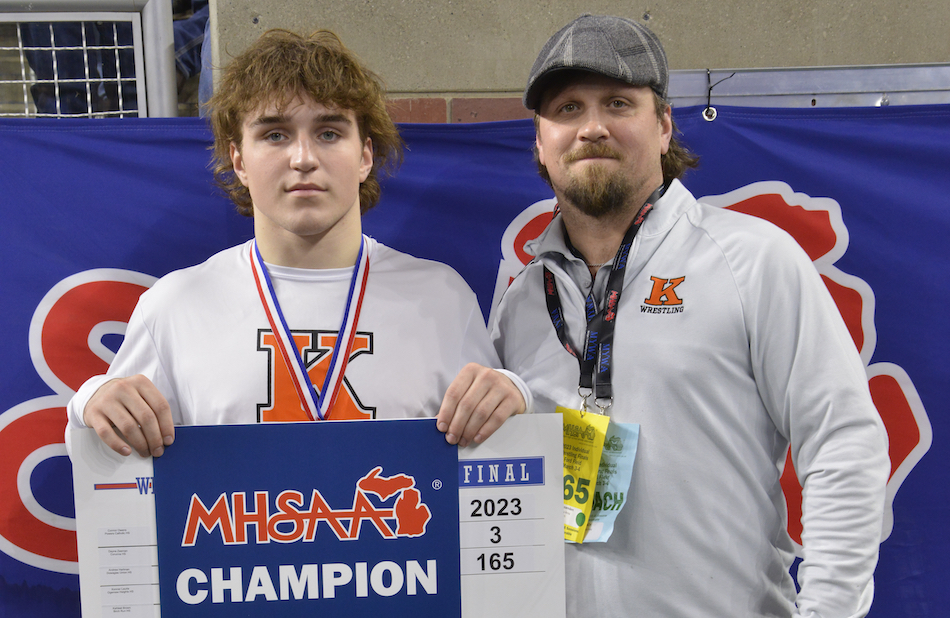
165
Champion: Kyan Fessenden, Kingsley, Sr. (41-1)
Decision, 4-3, over Connor Owens, Flint Powers Catholic, Sr. (26-2)
With his prep career winding down, Fessenden knew he had to pull out some magic.
Trailing 3-2 to Owens, the Kingsley senior fought his way to scoring a reversal in the closing seconds. That proved to be the difference.
“This was the last match of my high school career. You have to go big or go home, so that’s what I did,” Fessenden said.
The victory kept Owens from repeating as champion, while giving Fessenden his first title.
“It feels amazing. (Owens) is a great competitor, and being able to beat him makes it even more special,” Fessenden said. “He really pushed me to my limit.”
175
Champion: Noah Etnyre, Lutheran Westland, Sr. (46-3)
Fall, 2:35, over Gavin Craner, Belding, Soph. (53-5)
Only one pinfall victory occurred in the Division 3 Finals on Saturday, and that went to Etnyre.
He trailed Craner 2-0 early, but managed a quick escape and eventually secured a takedown early in the second period that led to a pin.
“I felt like I had better hips, and I felt like I would be able to win the scrambles with him. That’s what set up the win,” Etnyre said.
Etnyre was the Division 4 171-pound runner-up in 2022 and felt like Saturday’s victory was a nice redemption story to end his career.
“This feels great. It has been my goal since freshman year to win a state title,” Etnyre said. “I am just blessed to be here and be able to be a champion.”
190
Champion: Bryson Hughes, Reed City, Sr. (50-2)
Decision, 5-3 (OT), over Troy Demas, Constantine, Sr. (50-2)
A takedown in sudden victory was the difference as Hughes got past Demas.
“It was all about working. Just always work. Nothing is ever settled, you have to settle it yourself,” Hughes said. “That was a great challenge. (Demas) is a great athlete and an excellent wrestler. It was just about pushing myself to be the best.”
Each wrestler led during regulation, but were evenly matched. A fatigued Hughes could barely put into words how he felt about winning.
“It hasn’t quite hit me yet, but I know that in the days to come I am going to be very happy,” Hughes said.
215
Champion: Elizin Rouse, Kingsford, Jr. (35-4)
Decision, 5-3 (OT), over Bennett VandenBerg, Constantine, Jr. (54-2)
March is known for upsets, but the 11th-seeded Rouse provided one of the all-time upsets when he won the 215-pound championship this weekend.
“I knew the seeding wasn’t right. They haven’t watched me wrestle,” Rouse said of his seeding. “It’s no hate to them, they were just doing their job, but I had to prove them wrong.”
The junior from the Upper Peninsula needed overtime to get past VandenBerg. After trailing 2-0 in the second period, Rouse fought his way back and took a 3-2 lead in the third before VandenBerg forced OT with an escape.
In the extra period, Rouse powered his way to a takedown.
“We were both tired. I could hear him breathing heavy, and I know I was breathing heavy,” Rouse said. “I was just trying to push through to represent the boys from the U.P.”
285
Champion: Shane Cook, Whitehall, Sr. (62-0)
Decision, 9-5, over Landen Roe, Birch Run, Sr. (44-7)
The top seed and unbeaten Cook took control and never looked back. Going up 5-0 early in the second period, Cook was never in much danger of losing the 285-pound title match.
“The game plan was just to let it fly like I do any other match. Ultimately this match is just like any other. I had to score points like I would my other matches,” Cook said. “I was aggressive, and I was really happy with my performance.”
Saturday’s championship capped an impressive 62-0 record for the senior.
“It’s a pretty unreal feeling,” Cook said. “It hasn’t fully hit me yet. I’m trying to let it hit me, but it just hasn’t yet. I’m extremely happy right now, and I’m sure I’ll never forget this moment.”
PHOTOS (Top) Dundee’s Braeden Davis, top, works toward a win over Grand Rapids Catholic Central’s Michael Wilson on Saturday at Ford Field. (Middle) Kingsley’s Kyan Fessenden, left, shows his chart after defeating a past champion in his Finals bout. (Click for more from High School Sports Scene.)

